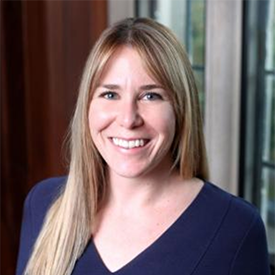Dean’s Early Career Research Award Recipients Announced
Assistant Professors Monica Rosenberg and Sarah Newman recognized with the inaugural round of awards and research funding
By Sarah Steimer
The first Dean’s Early Career Research Awards, a fund created by an anonymous donor in 2022, have been announced. This selective award recognizes and supports faculty who, at renewal as assistant professor in the tenure-track process, have shown outstanding accomplishment and promise in their research. This year’s awardees are Monica Rosenberg and Sarah Newman.
“This generous and forward-thinking gift allows the Division to honor and enhance the work of outstanding early career scholars,” says Division Dean Amanda Woodward. “Monica and Sarah are opening new ground in their respective fields, and it is wonderful that we are able to honor and support them in this way.”
Sarah Newman
Sarah Newman, an assistant professor in the Department of Anthropology, is an anthropological archaeologist who combines archaeological, historical, and art historical methods and evidence to explore anthropological and environmental issues, including histories of waste and reuse, long-term landscape transformations, and human-animal relationships. Much of her field research has focused on Mayan Mesoamerican communities, with a second, newer project in Petra Jordan. Newman also co-directs the Invisible Landscapes research project with Felipe Rojas of Brown University and Eduardo Goes Neves of the University of São Paulo, which collaboratively analyzes multi-scalar and multi-temporal anthropogenic landscapes across the globe.
Her research draws on broad methodologies, including remote sensing and geospatial analytics to analyze the ways in which people have shaped and reshaped landscapes, excavation and faunal analysis, historical archival research, and ethnography among current Mayan communities. In her forthcoming book, Unmaking Waste: New Histories of Old Things, due for release by the University of Chicago Press in April 2023, Newman uses her archeological research on Mesoamerica to ground a historical and comparative study of how the idea of “waste” has taken shape in Europe, North America, and Latin America. This comparative approach allows Newman to, as she writes “ask when, where, and why—in what contexts and under what conditions—people come to think of objects as having an end, as reaching a point where they become obsolete and worthless.” Her current book project, tentatively titled Animal Archaeology: Traces of Non-Human Histories, adapts questions and approaches archaeologists have used to study remote human histories and extends them to illuminate deep animal histories.
She earned her MA and PhD in Anthropology from Brown University and her BA in Archaeological Studies and Art History from Yale University.
Monica Rosenberg
Monica Rosenberg, an assistant professor in the Department of Psychology, is a pioneer in the use of very large, shared datasets to develop entirely new ways to understand the workings of the mind. She investigates the networks of neural activity associated with attentional control. In much of her work, she develops computational approaches (connectome-based predictive models) for analysis of fMRI data as a way to uncover the neural signatures of attentional engagement. Her models provide insight into foundational questions about the nature of attentional control, and into individual variation, developmental profiles, attentional disorders and the effects of pharmaceutical interventions. Such analysis advances the understanding of what can be learned about a person from their unique patterns of brain activity and what it can explain about the nature of the brain and mind.
Rosenberg received a “Rising Star” Award from the Association for Psychological Science in 2020 and Sloan Research Fellowship in Neuroscience in 2022. She was named one of the Forbes Science 30 Under 30 in 2017. Rosenberg joined UChicago in 2019 after completing her Ph.D. and postdoctoral work in psychology at Yale University, and her undergraduate degree in cognitive neuroscience at Brown University.
 THE UNIVERSITY OF CHICAGO
THE UNIVERSITY OF CHICAGO



